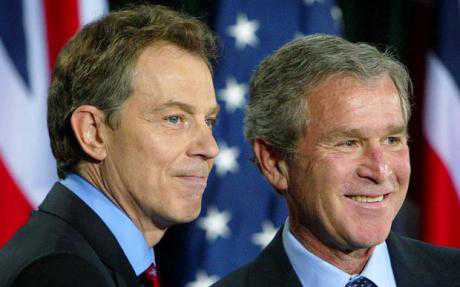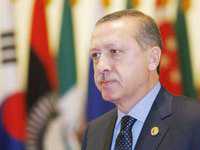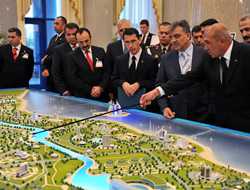 George W Bush, the former US president, has launched his memoirs and given a series of interviews, which provide fascinating insights into his views on foreign powers, among them Saddam Hussein’s Iraq and Tony Blair, the former Prime Minister.
George W Bush, the former US president, has launched his memoirs and given a series of interviews, which provide fascinating insights into his views on foreign powers, among them Saddam Hussein’s Iraq and Tony Blair, the former Prime Minister.
By Andy Bloxham
On Tony Blair:
He compared Mr Blair to Winston Churchill and disclosed that, on the eve of the war in Iraq, the British PM was willing to risk bringing down the Government to push through a vital vote. He cites Mr Blair’s “wisdom and his strategic thinking as the prime minister of a strong and important ally”, adding: “I admire that kind of courage. People get caught up in all the conventional wisdom, but some day history will reward that kind of political courage.”
On British and European public opinion:
The former president was frank about the lack of weight he attached to how he was thought of in the UK both while he was in power and since he left it, saying: “It doesn’t matter how people perceive me in England. It just doesn’t matter any more. And frankly, at times, it didn’t matter then.” He said: “People in Europe said: “Ah, man, he’s a religious fanatic, cowboy, simpleton.” All that stuff… If you believe that freedom is universal, then you shouldn’t be surprised when people take courageous measures to live in a free society.”
On Saddam:
“There were things we got wrong in Iraq but that cause is eternally right,” he said. “People forget he was an enemy, he had invaded countries, everybody thought he had weapons of mass destruction, it became clear that he had the capacity to make weapons of mass destruction. What would life be like if Saddam Hussein were [still] in power? It is likely you would be seeing a nuclear arms race.” He also adds that Saddam disclosed his reasons for pretending to have WMDs when he could have avoided war were because “he was more worried about looking weak to Iran than being removed by the coalition.”
On Afghanistan:
“Our government was not prepared for nation building. Over time, we adapted our stratedy and our capabilities. Still, the poverty in Afghanistan is so deep, and the infrastructure so lacking, that it will take many years to complete the work.”
On Iran:
“A government not of the people is never capable of being held to account for human rights violations. Iran will be better served if there is an Iranian-style democracy. They play like they’ve got elections but they’ve got a handful of clerics who decide who runs it.”
On China:
He believes its internal politics will stop it being a superpower economy to rival the US for many years. “China, no question, is an emerging economy. China has plenty of internal problems which means that, in my judgment, they are not hegemonistic. They will be seeking raw materials.”
On Syria:
Mr Bush recounts an incident when Israel’s then-prime minister Ehud Olmert called him to ask him to bomb what Mossad agents had discovered was a secret nuclear facility in Syria. He said no but Israel destroyed it without warning him. Telling the story appears to signal his displeasure at not being told.
https://www.telegraph.co.uk/news/worldnews/northamerica/usa/8119227/George-W-Bush-memoirs-foreign-powers-and-Tony-Blair.html, 09 Nov 2010





